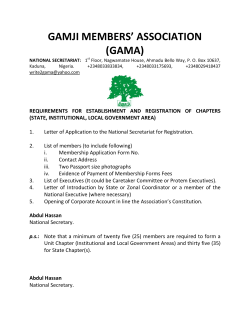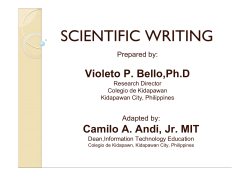
Laying waste to community dumpsites
21 Apr 2015 Volume 7 Kirsten(Jack( Toju(Briggs( Senior!Manager!–!Cities!and!Climate!Change! Project!Co:ordinator! Kirsten.jack@adamsmithinternational.com! Toju.Briggs@niafng.org! ! Laying waste to community dumpsites Executive Summary • • • NIAF’s innovative model of small-scale solid waste collection has become a template for state-wide delivery Successful pilot in 100,000 person Zaria district has paved the way for city-wide rollout ‘Right-sized’ service mechanism has now been replicated in procurement models across Kaduna State The Challenges • • Low-income communities in cities across Nigeria suffer from poor service delivery due to low levels of accessibility, and procurement contracts designed around the needs of higher-income communities NIAF faced two main challenges; a) Limited but entrenched service models already operational b) A lack of existent service models, which balanced both wider community needs and supplier incentives. The NIAF Approach • • • • ! Development of a ‘right-sized’ hopper and motor-trike technology solution appropriate for high-density neighbourhoods Collaboration with Ahmadu Bello University services (ABUs) to propose new anchor institution and community delivery model Support in structuring contract negotiations between the state government and Ahmadu Bello University services Promoted knowledge sharing and replication through engagement with State environment agency, and apex ministry. Implemented)by:) The Story In December 2014, NIAF launched the Ahmadu Bello University (ABU)-community partnership for solid waste management in Zaria. Solid waste dumping causes environmental contamination, increases flooding, pollutes drinking water and turns public space into dangerous dumpsites. NIAF has been working with Ahmadu Bello University to develop community-led waste management models for low-income neighbourhoods blighted by unregulated waste dumping. This month saw the culmination of NIAF efforts, with Kaduna Environmental Protection Agency awarding the University-community partnership a waste management contract. A first for the MDA, the contract creates a framework through which the state can pay community-based contractors to deliver more appropriate waste management services for the 100,000 people of Samaru. Work on cleaning up the district began in earnest from day 1, with over 200 trucks of waste cleared from the playing fields of the district school. The area is now being transformed, streets are cleaner, the former dumpsite set to be transformed into a community park, and new school classrooms have been constructed. In 2015 NIAF began promoting replication of this innovative model with plans for extension of the Ahmadu Bello University Service contract to additional neighbourhoods. In addition the piloted hopper and motor-trike technology model has been adopted by the state, and a hire-purchase arrangement created, with 50 trikes made available to urban SWM contractors across the state. The Outcomes • • • ! Improved Solid Waste Management services to 100,000 people in Samaru, Zaria Environmental management improvements resulted in inward investment to communities Model replicated across urban areas in Kaduna resulting in improved solid waste services and environmental conditions across urban communities across Kaduna state. ! Implemented)by:) Iden@fy! Appropriate! Technology! Create!local! delivery!model! Pilot!in!Samaru,! Zaria! Secure!service! contract! Publicise! approach!to!gain! buy:in! Improved!services! promote!inward! investment! ...!and!promotes! replica@on!across! Kaduna!
© Copyright 2025









